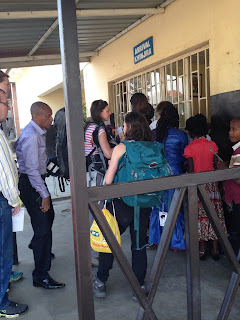 On Saturday morning, we reunited with the beautiful Judy and
Marie-Eve, two 5th year medical students at the University of Rwanda
in Kigali. We met them several weeks ago
through a friend of a friend of a doctor and instantly fell in love. While both are Rwanda, Marie grew up in the
Congo (Goma!) where her family still lives.
Judy was part of Medical Students for Choice, the same group that we
have at Rush and we all bonded over conversations about the need for safe, legal
abortions in Rwanda (and the States!).
It is currently illegal to perform an abortion in Rwanda and as such,
during her rotation at the Kigali teaching hospital (CHUK), she saw a saddening
array of complications and outcomes due to women trying to perform their own
abortions.
On Saturday morning, we reunited with the beautiful Judy and
Marie-Eve, two 5th year medical students at the University of Rwanda
in Kigali. We met them several weeks ago
through a friend of a friend of a doctor and instantly fell in love. While both are Rwanda, Marie grew up in the
Congo (Goma!) where her family still lives.
Judy was part of Medical Students for Choice, the same group that we
have at Rush and we all bonded over conversations about the need for safe, legal
abortions in Rwanda (and the States!).
It is currently illegal to perform an abortion in Rwanda and as such,
during her rotation at the Kigali teaching hospital (CHUK), she saw a saddening
array of complications and outcomes due to women trying to perform their own
abortions. Needless to say, they are both amazing, inspiring women!
Therefore, we decided to attempt a second summit of Mount Kigali, this time aiming for the fabled outlook of Mera Neza, which apparently translates into “Be good!” in Kinyarwanda. The hike was exponentially faster than last time, with us reaching the pine tree ridden outlook of Mera Neza in less than 25 minutes. Aside from the more direct route and fact that Judy and Marie could ask for directions, we are also beast of hikers. :)
Here are some videos from the hike and our adventures:


















